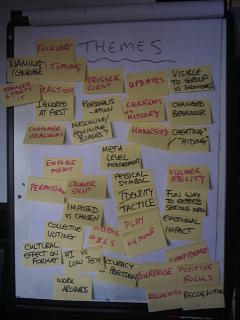Wrapping up with Kent at XP2005
The end of the conference featured Kent Beck, twice. First he joined a panel discussion on Leadership (summarised here by Steve Freeman, and from which I took away the strong conclusion that leadership starts with holding one's own congruent stance in the face of resistance and then pulls others in to acting congruently as well). Then he had the stage to himself for the keynote speech, entitled Another notch. It addressed in a wide-ranging way the possibilities opened up by embedding the values of XP in an organisation's culture and philosophy, a theme that seemed to be bubbling under many of the sessions in the conference.
Initially Kent pursued the idea that XP is bigger than mere practices, that "technical success is not success", and that all the best TDD and refactoring and continuous integration in the world won't matter if a project fails to meet the needs and timetables of its sponsors and users. "Typing in a line of code has consequences" he said, and those consequences are part of a larger world-view that needs to be embraced if XP is to move up another notch. Is programming really the best focus of all of our energy? Perhaps the application of the technical processes described in the first edition of the white XP book has moved project constraints away from programming to a different aspect of the development process? (The theory of constraints shows that micro-optimisation of one step in a complex process can in fact degrade the throughput of the process as a whole.) There might be a lot of other non-programming tasks that can be done right now to eliminate the constraints in the wider team, department or organisation: "it's a fiction to believe that if I get all my tests green then the project's ok and I've done my part" as he put it.
The next part of the speech was a request for the XP community to take accountability - "rendering an account of your actions to others" - more seriously. Accountability is a synonym for fault in blame-ridden organisations, but this is not its real meaning. To hold myself accountable is to be proud, honest and open about what I do, to live the values I espouse. To "overcome the disconnect between the satisfaction I get from programming and the dissatisfaction I get from life". To understand that I can't really change my organisation, and I can really change myself. To cope with the realisation that enacting the transition to XP requires respect for the starting point, and is "more than saying everything will work out if everyone does as I say". (At which point Kent started praising the approach taken by Appreciative Inquiry, which was nice...)
He wrapped up by sketching out his vision for what will happen as XP is taken up another notch. People and projects will be truly accountable and have nothing to hide. Teams and individuals will express their XP values in all their actions and interactions. The confidence to hold onto ones self in the face of pressure will engender trust, creativity and learning. And as a happy side effect software projects will get delivered quickly and at high levels of quality too.
I'll sign up to that.








